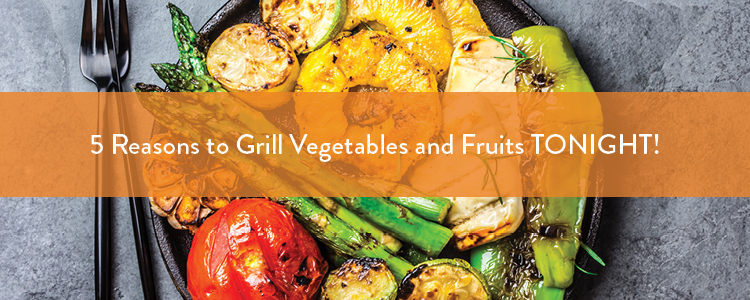
…And How to Do It!
Fruits and vegetables might not be the first foods that come to mind when you think about grilling, but I’m out to change that. The grill is a perfect place to highlight the bounty of summer and show off the flavors of your favorite organic produce. Here are five great reasons to slide those burgers over and make some room on the grill for organic fruits and vegetables, tonight!
- Grilled fruits and vegetables are delicious! Grilling brings out the natural sweetness of organic fruits and vegetables and adds a little smoky flavor. It makes elegant summer fruit desserts in minutes and will turn the most ardent veggie haters into veggie lovers. Grilling enhances the flavors of most all organic vegetables and fruits in ways other cooking methods just can’t touch, making taste my number one reason to add more produce to your summer grilling repertoire.
- Fruits and vegetables are tops for your health. Everybody knows that fruits and vegetables are an important part of a healthy diet, and research just keeps confirming it. A recent meta-analysis, including two million people worldwide, found that eating 10 servings of fruits and vegetables a day (a recommendation Natural Grocers has long been making) supports optimal health in a myriad of ways, including supporting healthy longevity. Adding more organic vegetables and fruits to all of your meals, including those prepared on the grill, is an easy way to create a healthy balanced meal, and is a no brainer for optimal health.
- Grilled fruits and vegetables are safe. Organic fruits and vegetables don’t form heterocyclic amines (HCAs), dangerous compounds that form when meat is cooked at high temperatures, such as during grilling. Sorry to be the bearer of bad news, but those beloved bits of char are full of HCAs that form when amino acids, sugars, and creatine react at high temperatures. Because vegetables don’t contain creatine they don’t form HCAs, even at high temperatures. (To learn all about healthy grilling, check out this article.)
- Grilled fruits and vegetables are protective. Speaking of HCAs, numerous fruits and vegetables have been found to help the liver detoxify these dangerous compounds and to help cells maintain their integrity after exposure. [fn value=1][/fn] [fn value=2][/fn] [fn value=3][/fn] Adding a heaping side (or two) of grilled vegetables to your meal is a great way to counter the dangers grilled meat can pose.
- Grilled fruits and vegetables help keep the peace. Since everyone from meat eaters to vegans can enjoy grilled fruits and vegetables they are perfect to include in all of your outdoor parties to keep everyone happy—and healthy!
Putting your vegetables and fruits to the flame is not only delicious, it is also an easy way to incorporate more good4u organic produce into your diet. Here are some tips to make your foray into the world of grilled produce a success:
- Nearly any vegetable can be grilled, but firmer varieties such as artichokes, potatoes, beets, and other root vegetables benefit from a short precook prior to grilling. This can easily be done by boiling, steaming, or microwaving until the produce is just barely tender.
- A little bit of oil helps to prevent fruit and vegetables from sticking to the grill. You can lightly coat your produce before putting it on the grill or lightly coat the grill grates (use a paper towel coated in oil with tongs to do this). Be careful not to use so much oil that excess drips onto the flames, and choose a heat-stable oil such as melted ghee or coconut oil for medium-high heat, or olive or avocado oil for low-medium heat grilling.
- Pay attention while grilling—many fruits and some vegetables will be grilled to perfection quickly, but burnt to a crisp not long after. Medium heat is generally best for grilling fruits and vegetables, but be sure to keep an eye on their progress.
- A wide variety of fruits are great on the grill, but in general you want to stick with firmer varieties. Try stone fruits (pits removed), pineapple slices, melons, figs, kiwis, strawberries, apples, and even bananas.
- There is no need to season or marinate fruits or vegetables ahead of time, but if you do want to enhance the flavor, try a simple oil and vinegar herb dressing for vegetables and some honey or maple syrup and cinnamon for fruits.
- Pay attention to grill placement so you don’t lose your precious produce to the fire. A grill pan made specifically for smaller items can be a big help here.
- Experiment with a variety of fruits and vegetables cut to different thicknesses and cook over both direct and indirect heat for subtle differences in flavor. Let your imagination run wild and you’ll quickly find your favorites. For some easy starting points, check out the recipes below.
Recipes to Try
Do you love to grill fruits and vegetables and have a tip or favorite recipe to share? Post it in the comments section below!
References
[2]Walters DG, Young PJ, Agus C, et al. Cruciferous vegetable consumption alters the metabolism of the dietary carcinogen 2-amino-1-mathyl-6-phenylimidazo[4,5-b]pyridine (PhIP) in humans. Carcinogenesis. 2004;25(9):1659-1669.
https://www.ncbi.nlm.nih.gov/pub[3]Edenharder R, Sager JW, Glatt H, Muchkel E, Platt KL. Protection by beverages, fruits, vegetables, herbs and flavonoids against genotoxicity of 2-acetylaminoflourene and 2-amino-1-methyl-6-phenylimidazo[4,5-b]pyridine (PhIP) in metabolically competent V79



 Denver - Design District - Alameda and Broadway
Denver - Design District - Alameda and Broadway
 Preferred Store:
Select a Store
Preferred Store:
Select a Store





